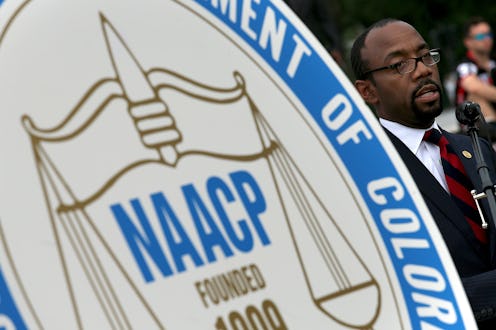News
Is Rachel Dolezal A Setback For Race Relations?
Activists and community members are worried that race relations progress in Spokane, Washington will be set back after Rachel Dolezal, the former president for the city's NAACP chapter, received national criticism for posing as a black woman when her parents say she is white. Spokane, which has a population of 210,000 people, is 90 percent white and 2 percent black, according to the Associated Press. The region surrounding Spokane used to be home to The Aryan Nations, a neo-Nazi organization, and activists have said that overcoming the region's racist past hasn't been easy.
Although Dolezal stepped down Monday, the fact that she lied about her racial heritage for so long is troublesome to many community members within Spokane, who often looked to her for guidance on issues surrounding race. Blaine Stum, head of the Spokane Human Rights Commission, said Dolezal's "lies have done damage to the people who trusted her," but that he didn't think the scandal would hurt the fight for racial justice, according to the AP. Regardless, there is work to be done surrounding race and diversity in Spokane. Newcomers can be shocked by the lack of diversity, according to the Spokesman-Review. Camilo Madero, who moved to Spokane a year ago after living most of his life in Bogota, Colombia, and San Juan, Puerto Rico, told the Review he was definitely surprised:
In my daughter’s school there’s only one African-American family. One! My God! That’s incredible.
Residents of Spokane have expressed frustration with the scandal, because their city has done so much great work on race relations. Virla Spencer, who is black and lives Spokane, called the scandal a "setback," according to the AP:
It's sad we have to focus so much on this when there is so much more work to do.
Ijeoma Oluo, writing for the Seattle Globalist, said that black members of the community — in Spokane and around the U.S. — are feeling hurt by Dolezal for a number of reasons. He wrote that she simplified black culture into skin tone and hair texture and "divorced the best of black culture from the struggle it was born in." Oluo argued that Dolezal might create a setback for the movement for black equality because she has undermined what it means to speak from experience:
It’s important to know if opinions being discussed come from people who have actually experienced what they are talking about. In addition, according to accounts by white anti-racist activist Tim Wise, Dolezal used her status as a “black” woman to try to prevent him from speaking at (Eastern Washington University), arguing that as a white man, he wasn’t qualified to speak on issues affecting black people. She used her fake identity as a black woman to try to control the education on black issues that her students received.
Elmo Dalbert, a longtime Spokane resident, said that even in her grandfather's era, which she researched as a college student and hopes to turn into a documentary, racism in Spokane was an underground phenomenon that showed up unexpectedly — and still does. She told the Review (in an interview unrelated to the Dolezal controversy) that its unspoken hatred and shame built up over time that she's afraid of:
I’m more fearful of those who hide their beliefs as opposed to ... people letting me know they hate me. I think that people police themselves a lot better now. And it’s not that blacks will get mad, it’s that other white people will look down on them in shame.
Could incidents like Dolezal lying about her real race in order to be a savior for another contribute to this shame? That's the worry biting at Spokane activists. Angela Jones, an NAACP member, told the AP that Dolezal going into the black community and describing herself as African American was "the ultimate betrayal":
She has to heal. I have to heal.
Images: Getty Images (2)
